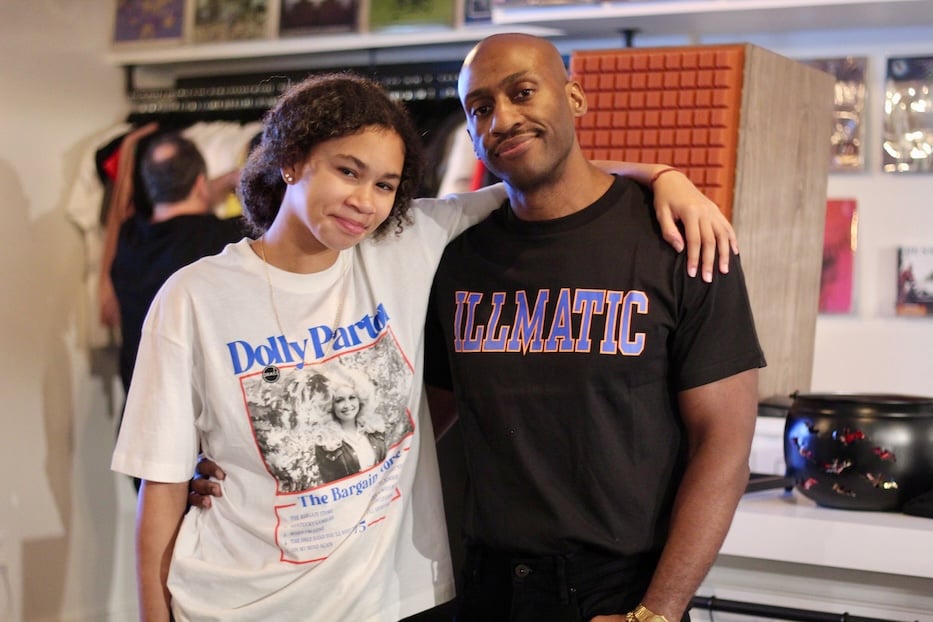
Black-owned businesses | Culture & Community | Downtown | Economic Development | Music | Arts & Culture

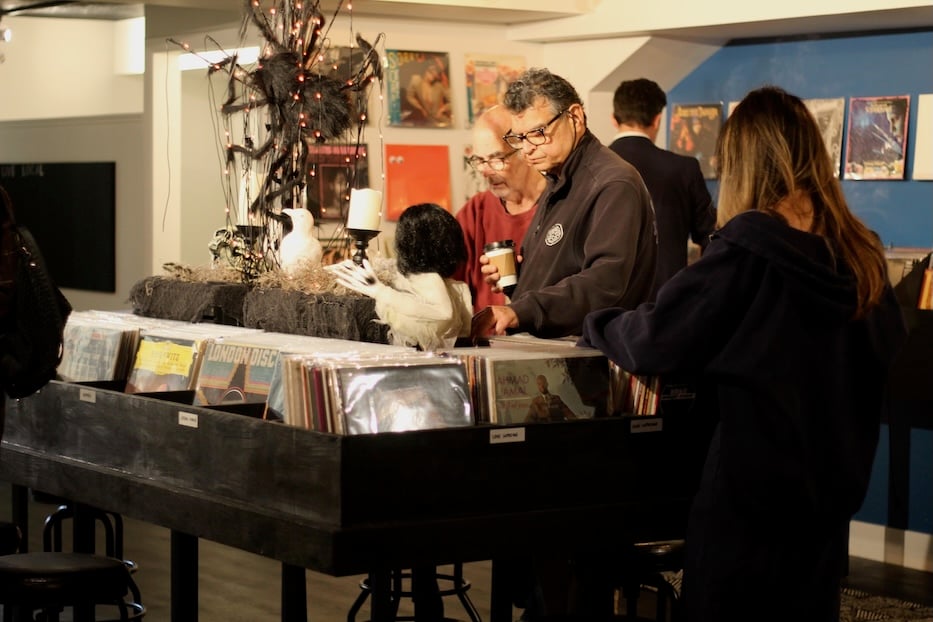
Top: Town Green Special Services District's Win Davis, David DelVecchio, Director of Real Estate Asset Management, University Properties, New Haven Mayor Justin Elicker, Emilia Boerger, King Kenney, Arts Council Executive Director Hope Chávez, and Greater New Haven Chamber of Commerce Director Garrett Sheehan. Bottom: Grails gets its first customers. Lucy Gellman Photos.
King Kenney reached into a record sleeve, his hands gentle as they grazed the thin, curved vinyl inside. At tables across the room, Candice Lynch and Tim Mannle flipped through rows and rows of vinyl, from recordings of Gil Scott-Heron, Run DMC and the Wu-Tang Clan to Ahmad Jamal’s “All of You.” Chatter rose to a hum around the store, filling the empty DJ booth like a welcome soundtrack.
Kenney, satisfied, lifted the tonearm, slipped in the record and lowered the needle. Within seconds, Duke Ellington and John Coltrane’s “In A Sentimental Mood” drifted through the space, a soft, familiar crackle somewhere beneath the tinkling keys.
Kenney—who has lived many lives as a DJ, writer, arts employee, real estate developer, and unhappy tech worker—is the owner of Grails, a new record store on the lower level 1020 Chapel St. in the former home of a hair salon. Part-business and part community hub, the store marks a sort of record renaissance in the heart of the city, where Cutler’s closed its doors in 2012.
It is the second record store to open in New Haven in the last decade: the first, Elm City Sounds, popped up on Whalley Avenue in 2018. What sets it apart is its mission to be a third space, from live paint nights to a “Grails Scholars Program” that directly supports students in Neighborhood Music School’s (NMS) DELTA (Developing and Empowering Leadership Through the Arts) initiative.
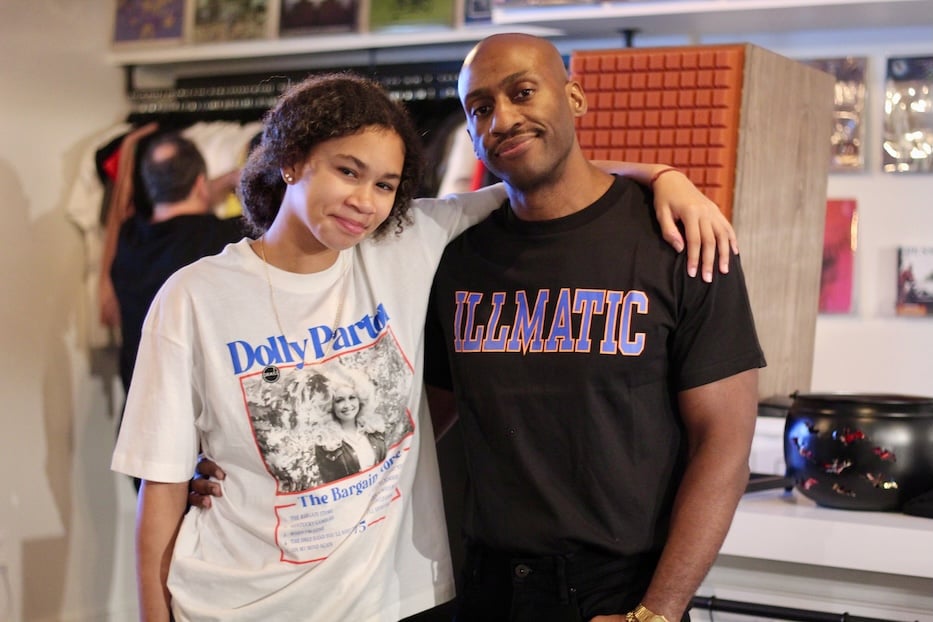
Emilia Boerger and King Kenney.
“I just want to say that I’m grateful,” said Kenney at a ribbon cutting Wednesday morning, the emotion audible in his voice as he tried not to cry. “We moved here, and I couldn’t find family. The community embraced me. That’s the most important thing.”
Grails, which references Kenney’s own holy grails, of which he has thousands is very much a reflection of that community. From the moment a person enters the front door, there are records everywhere: tables with built-in shelving for vinyl, pillars with display racks that protrude into the room; records installed behind the register and neatly arranged on every wall. Cotton t-shirts, most emblazoned with band names and album covers, hang neatly on a rack by the register.
Across the room, Kenney has also created an invitation to gather. A bright chess table sits between two plush chairs, inviting people to take a load off and play for a while. In a small room off to the side, a giant game of Connect Four sits on one wall, just waiting for people. A DJ station waits eagerly in the far left corner, with equipment stacked high enough to make it feel like a separate space. Through the Grails Scholars Program, that invitation extends beyond the store itself; Kenney said that he will provide up to four scholarships, which run about $5,000 per student, per year.
Maybe because Kenney is a dad himself, and maybe because it fits into the mission like a puzzle piece, there is also a section designed entirely for children, including a tiny record player on an equally small Montessori table (he has managed, quite artfully, to achieve maximum cuteness with minimal twee), with little LPs in a bin beside it. There are Nirvana onesies and tiny t-shirts for bands like The Beatles, Red Hot Chili Peppers, Prince, and Guns N’ Roses; baby lullabies of Dolly Parton, Marvin Gaye, Taylor Swift, Eminem and others from Los Angeles-based record label Rockabye Baby; music-themed toys and tiny LPs, made for equally small hands.
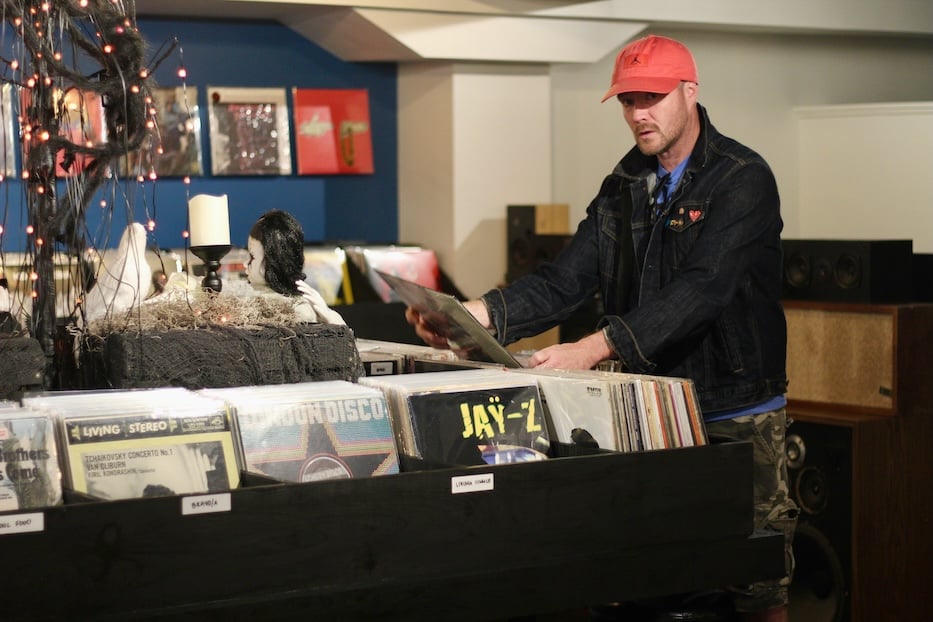 Together and apart, they tell a story of Kenney’s vast musical tastes, from Jim Lang’s Hey Arnold and the Sonic the Hedgehog soundtracks to Van Cliburn’s 1958 recording of Tchaikovsky’s Piano Concerto No.1.
Together and apart, they tell a story of Kenney’s vast musical tastes, from Jim Lang’s Hey Arnold and the Sonic the Hedgehog soundtracks to Van Cliburn’s 1958 recording of Tchaikovsky’s Piano Concerto No.1.
Raised between New York and North Carolina, Kenney fell in love with records through his grandfather, Carl Kenney, Sr., an avid and savvy collector who raised his family in Columbia, Missouri and remained there until his death in 2015.
The elder Kenney was a janitor, but saved up to buy records, with an interest in music that he passed down to his son, the journalist, professor and DJ Carl Kenney, Jr., and then his grandson (Kenney is still working on the music tastes of his 12-year-old daughter, Emilia Boerger, who may prefer KPop Demon Hunters to Duke Ellington).
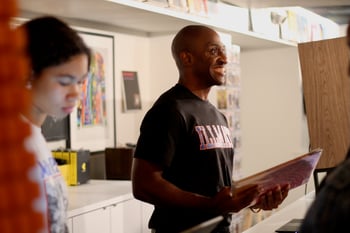 Records have always been his way of connecting with, and keeping alive, that tradition. From Kenney’s teenage years (“I was young!” he said when asked when he started collecting), a love for vinyl followed him to North Carolina Central University, and later Howard University’s School of Business. It flowed through his work as a writer and music journalist, and through cultural collaborations and curated musical events that made his work in Durham shine.
Records have always been his way of connecting with, and keeping alive, that tradition. From Kenney’s teenage years (“I was young!” he said when asked when he started collecting), a love for vinyl followed him to North Carolina Central University, and later Howard University’s School of Business. It flowed through his work as a writer and music journalist, and through cultural collaborations and curated musical events that made his work in Durham shine.
It remained with him at Long Wharf Theatre, where he ran marketing and communications during a years-long stretch of pandemic pivots and a triumphant return to the stage, and fell in love with New Haven in the process. And it stayed with him when, after years of caring for family in North Carolina and Arizona, he and his nuclear family moved back to New Haven, because it was where their community was.
In addition to Emilia, he has had help putting the shop together from his partner, Lindsie Boerger, a clinical research coordinator at the Yale School of Medicine. For the last months, they’ve worked to make the space very much their own, from a quirky chess board and sunshine-yellow game table to the record player perched behind the register. Thanks to Boerger, the space is also filled with dangling lights, fake skulls, huge hairy spiders and unlit candles, just in time for Halloween.
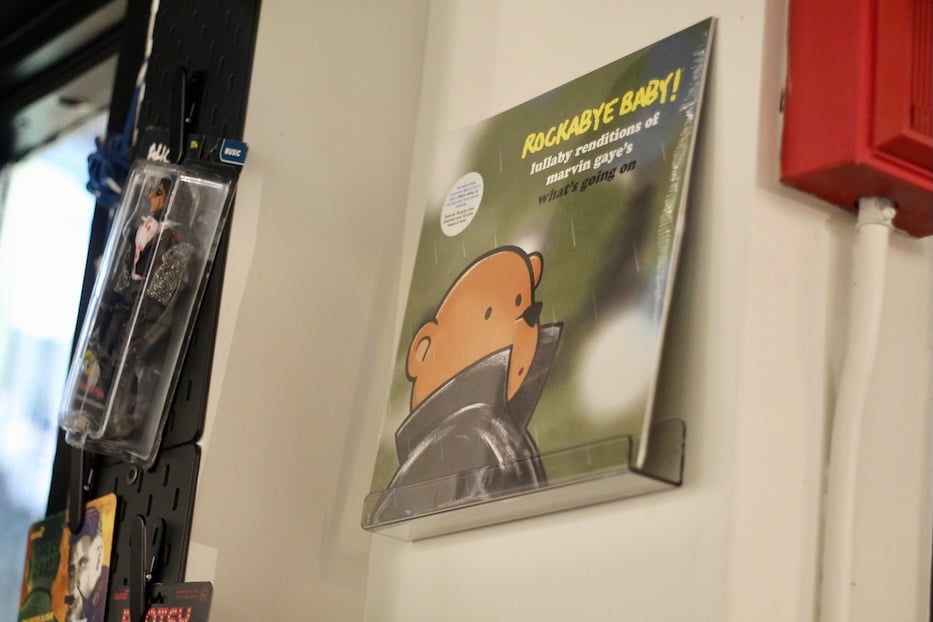
“We came back because we realized this was where we needed to be,” Kenney said Wednesday. Earlier in the morning, Boerger had burst through the door in scrubs before the ribbon cutting, her phone lifted and ready to show off the spooky decorations she’d put up before the opening celebrations. “It’s really really exciting!” she said. “Getting it [the store] set up was a lot of work.”
“Obviously, there’s commerce, but I want to be receptive to the community,” Kenney said when asked about his long-term vision for the store. “This is the path.” In addition to the Grails Scholars program, that may include DJ nights, chess tournaments, live painting, artist gatherings and collaborations with local arts organizations.
Wednesday, it was easy to see a slice of the community that Kenney has already built and nurtured in New Haven. As Yale Properties’ David DelVecchio futzed with a blue-and-white ribbon outside the store, Kenney looked across a crowd that included artists and small business champions from across New Haven, including former colleagues from Long Wharf and the Shubert Theatres, the Arts Council of Greater New Haven, and musicians like Rosalíe and Paul Bryant Hudson.
Even Mark Zaretsky, a reporter for the New Haven Register who plays blues in his spare time, had come dressed for the occasion in his Muddy Waters t-shirt. Every so often, passers-by slowed to inspect the balloons and podium that filled the sidewalk, and then stayed to listen to remarks.

“New Haven, as everyone knows, is the cultural capital of Connecticut, and what a welcome addition to the 700 small businesses that we have in our city that help us thrive as a community,” said Mayor Justin Elicker, who stressed the importance of music in his own life, and in the time he spends with his family. “It’s just a way, particularly in a really challenging time that we’re in right now, to connect with each other and see each other’s humanity.”
“I think we should all be very honored that he [Kenney] chose this as a place to build this business, and more importantly this community,” added Arts Council Executive Director Hope Chávez, who began her tenure just over two years ago (in the interest of full disclosure, the Arts Paper is part of but editorially independent from the Arts Council). “How can we continue to build economic vitality, sustainability for our sector through places like this?”
Inside the store, that vision came to life anew. As Emilia buzzed around the store in a Dolly Parton t-shirt—lovingly pilfered from her dad’s collection, Kenney confirmed—a steady trickle of patrons came through the door, some on the hunt for a specific record and others just there to browse the thousands of titles in front of them.
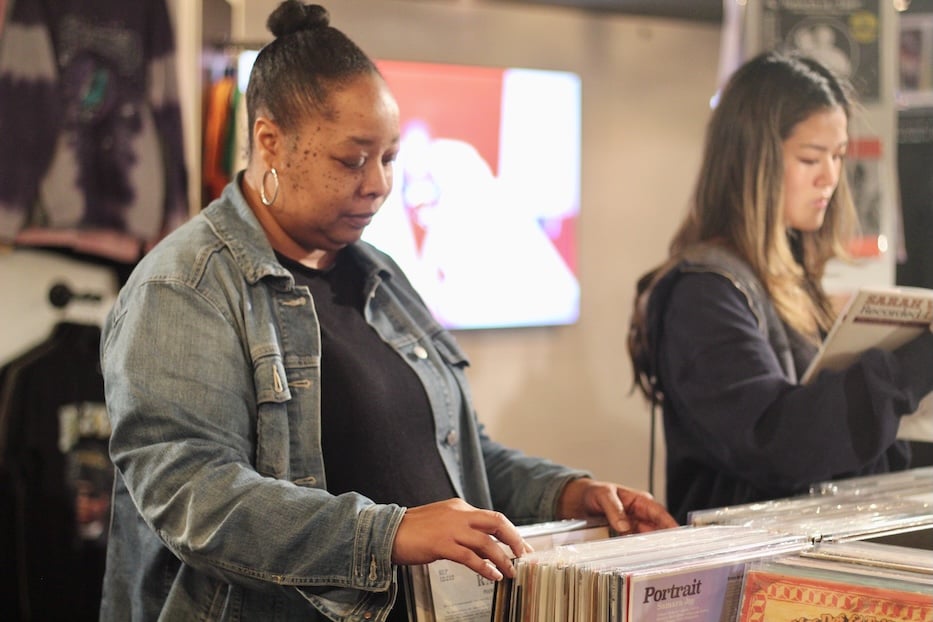
Candice Lynch. "It's my drug of choice," she said of listening to music.
Candice Lynch, the longtime operations manager at Elm Campus Partners, flipped through titles from poet Gil Scott-Heron and Tyler Okonma (better known as Tyler, The Creator), searching for a title that begged her to bring it home with her. While Lynch lives in Stratford, she has worked in New Haven for decades, and can remember when Cutler’s was just a short walk from her office.
As a deep lover of music—“it’s my drug of choice,” she said with a smile—she’s thrilled to have a record shop back in business close to where she works. On a given day, she’ll listen to any combination of genres, from rock and pop to jazz to soulful R&B (“really everything except country,” she said). Wednesday, she ultimately settled on an album from Salt-N-Pepa, excited to listen to it when she got home.
“I think this is perfect,” she said of the store. “It’s like being in your basement listening to your records. That’s the vibe.” She added that the sonic specificity of vinyl—”the actual, physical music, there’s a difference”— keeps her coming back to it.
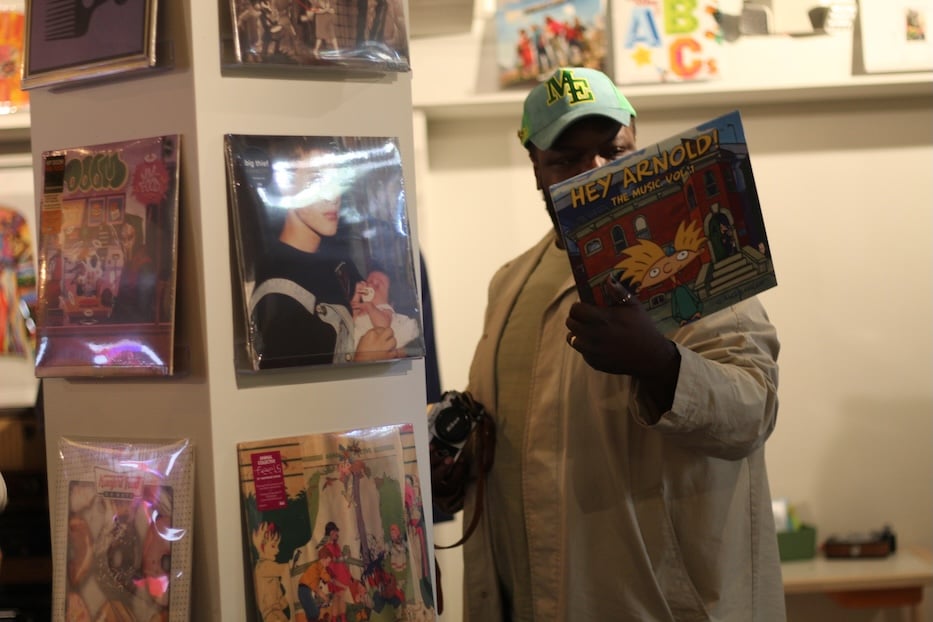
Nearby, musician Paul Bryant Hudson contemplated a copy of the Hey Arnold soundtrack, turning it over to read the back cover ("I just think Jim Lang is a genius," he said). As an artist whose own musical knowledge is as eclectic as it is vast, he pointed to both the tactile and the sonic experience of listening to vinyl. There's nostalgic value, yes, but the act of listening itself is much richer than pulling something up on a streaming platform and pressing play.
When he left the store half an hour or so later, it was clear that he would be back before long. Grails, for the music aficionado and the newbie, just seems to have that gentle pull.
“There’s something about listening to music that was produced to be on vinyl,” he said. “It’s not easy to replicate.”

